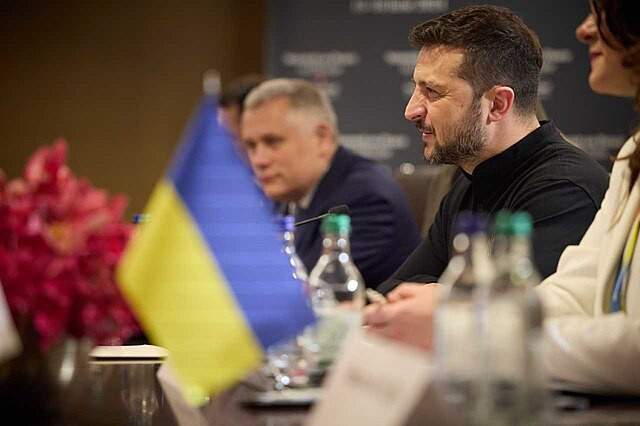Ukraine's air force successfully repelled a large-scale drone attack launched by Russia overnight, downing 58 out of 67 Shahed drones. The attack, which targeted multiple regions across the country, underscored the intensifying nature of Russia's military campaign as Ukrainian forces continue to push back against the invasion that began in February 2022.
The Ukrainian air force, in a statement on the Telegram messaging app, confirmed that air defense units were activated in 11 regions to intercept the drones. These Iranian-designed Shahed drones, which have become a staple of Russia's arsenal since September 2022, are a low-cost alternative to missiles and present a unique challenge for conventional air defenses due to their low flight altitude and reduced heat signature.
One of the more alarming aspects of this latest assault was the discovery of drone debris near the Ukrainian parliament building in Kyiv. The Verkhovna Rada, Ukraine's legislative body, released photographs showing at least four pieces of debris scattered near the building, including one piece found at the foot of the main entrance. This incident is particularly concerning as it is rare for Russian drones or missiles to penetrate so deeply into the heart of Kyiv, a city heavily protected by a combination of Soviet-era and Western air defense systems.
Reuters correspondents in Kyiv reported hearing a series of explosions around 3 a.m. local time, which reverberated through the city, waking residents and adding to the tension that has gripped Ukraine since the conflict began. Despite the severity of the attack, there were no immediate reports of casualties.
The drones, according to Ukrainian officials, were launched from two regions within Russia and from the Russian-occupied Crimean Peninsula. This coordinated attack follows a week of heightened aerial assaults across Ukraine, including a devastating missile strike in Poltava that resulted in the deaths of 55 people and injuries to 328 others. Another recent attack in Lviv, close to the NATO-member state of Poland, claimed the lives of seven people, including a mother and her three daughters.
As Ukrainian forces work to defend their territory, they are also continuing offensive operations against Russian targets. In the Russian border region of Voronezh, Governor Aleksandr Gusev reported that a Ukrainian drone attack sparked a fire and triggered the detonation of explosive objects, leading to the evacuation of several villages. Gusev did not disclose the names of the affected villages, citing concerns about sharing geolocatable information online.
On the ground in Ukraine, the situation remains dire. The Russian Ministry of Defense announced on Saturday that its forces had seized control of the village of Kalynove in the Donetsk region, marking another step in Moscow's accelerated advance in eastern Ukraine. The village, located about 25 kilometers from the strategic town of Pokrovsk, represents a key logistical point for Ukrainian forces.
Amid the ongoing violence, Ukrainian President Volodymyr Zelenskyy continues to press his allies for more support, specifically in the form of long-range strike capabilities. Zelenskyy has called on the United States to allow Ukraine to use its long-range weapons to target Russian military airfields, which he argues could significantly weaken Russia's ability to wage war. He reiterated these calls during a meeting with Italian Prime Minister Giorgia Meloni, where the two leaders discussed Ukraine's peace plan and the reconstruction of the country, with a particular focus on rebuilding the energy infrastructure devastated by the conflict.
The meeting with Meloni took place on the sidelines of the Ambrosetti Forum in Cernobbio, northern Italy, where Zelenskyy also addressed the broader international community. He rejected recent calls for a ceasefire from Hungarian Prime Minister Viktor Orban, arguing that Russian President Vladimir Putin has consistently failed to honor previous agreements, making any ceasefire premature without significant guarantees.






